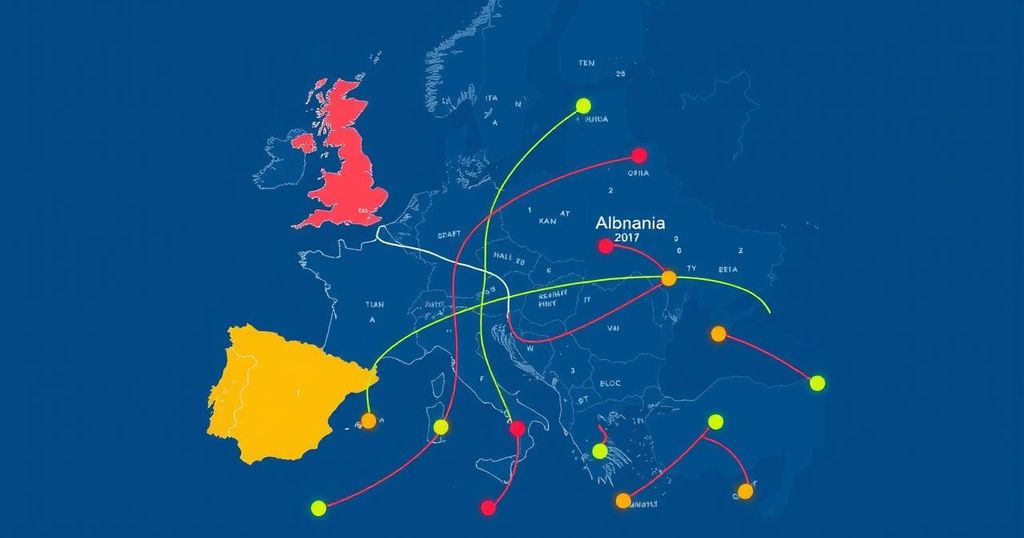EU Explores New Strategies for Managing Unwanted Migrants in Response to Rising Political Pressures
The EU is seeking nations to accept unwanted migrants following a summit that endorsed new strategies for managing asylum seekers. Proposed measures include the establishment of “return hubs” and relocation of asylum recipients. Countries such as Uganda, Italy, and Uzbekistan are part of discussions, indicating a shift towards stricter immigration policies amid growing anti-immigration sentiments in the region. The legal and humanitarian implications of these proposals continue to pose significant challenges.
The European Union (EU) is actively searching for nations willing to accept unwanted migrants following the endorsement of new strategies to manage asylum seekers by its top officials. This initiative includes the exploration of “return hubs” reminiscent of a prior UK proposal aimed at deporting unsuccessful asylum applicants to Rwanda. The EU is also considering relocating individuals granted asylum to designated safe third countries. Notably, Poland’s Prime Minister, Donald Tusk, has secured implicit agreement from the EU to suspend asylum rights in response to an influx of border crossings from Belarus. European Commission President Ursula von der Leyen has emphasized the necessity for countries to implement temporary and appropriate measures This shift reflects the growing influence of anti-immigration sentiment within the EU, especially following significant victories by far-right parties in countries such as Austria, Germany, and the Netherlands. However, the feasibility of the proposed policies remains uncertain, particularly regarding legal restrictions that prevent the return of individuals to conflict zones or abusive environments. At this stage, no specific destination for these return hubs has been finalized. The Netherlands has proposed Uganda, while Italy supports the idea of repatriating refugees to Syria. Discussions between the German government and officials in Uzbekistan have also taken place regarding potentially receiving deported migrants, contingent on favorable conditions for guest workers. Chancellor Olaf Scholz has dismissed calls to include Tunisia, Morocco, and Algeria on a list of safe countries for migration. Italy is instituting an asylum processing scheme in Albania, although it faced preliminary issues when initial migrants were unable to proceed due to health and age disputes. The joint resolution from the EU summit underscored the importance of adhering to EU and international law while exploring options to enhance and accelerate deportations. Dutch Prime Minister Dick Schoof has recommended Uganda as a location for processing migrants who have unsuccessfully sought asylum, stating, “These are innovative solutions that should in principle interest our colleagues here.” Currently, only 20% of those who are denied asylum are deported to their home countries. The response from Uganda has been mixed, with its Foreign Minister expressing a willingness to engage in discussions while a junior minister highlighted the country currently hosts a substantial number of refugees from various neighboring countries. The socio-economic situation in Uganda has improved, allowing it to ascend the UN development index, yet human rights concerns persist, affecting international financial support. The EU is reevaluating its stance on permanent deportations and how externally processing asylum requests may unfold. Afghans comprised a significant portion of last year’s asylum applications, raising complications about their potential repatriation given the EU’s non-recognition of the Taliban regime. Meanwhile, Germany has initiated discussions focused on potential repatriation agreements with Uzbekistan, given its geographical proximity to Afghanistan. Despite the precarious situation in Central Asia, which has become a focal point for security issues in Europe, the EU’s commitment to maintaining the right to asylum is highlighted amid pressures for increasingly strict asylum policies. This ongoing struggle to balance humanitarian obligations with national security concerns continues to pose challenges within the framework of EU migration policy.
The topic of European migration policy is increasingly relevant as the EU faces pressures related to an influx of asylum seekers. Striking a balance between humanitarian responsibilities and the growing desire for stricter immigration controls has become a focal point of discussions among member states. Recent elections across various EU member states have favored hardline anti-immigration parties, prompting new strategies to address the surge in asylum claims. The rise of these sentiments has led to discussions about alternative solutions for processing asylum requests, including the establishment of external processing centers in different countries. This evolution in policy reflects broader geopolitical developments and issues surrounding international human rights commitments, prompting critical dialogues on the future of asylum in Europe.
In conclusion, the European Union is actively pursuing innovative strategies for managing unwanted migration amid shifting political landscapes and increasing anti-immigration sentiment. With suggestions for return hubs in nations such as Uganda and potential repatriation agreements in Central Asia, the EU continues to seek solutions that align with its legal and humanitarian obligations. Nevertheless, the complexities of implementing such policies bear significance as member states navigate the conflicting dynamics of asylum rights and national security concerns, underscoring an ongoing debate over the future of Europe’s migration approach.
Original Source: www.thenationalnews.com




Post Comment